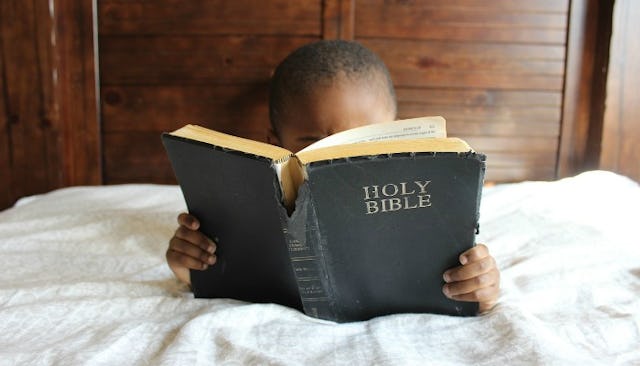I'm Raising My Child Without Religion, And Don't Worry, They're Not Going To Be A 'Bad Person'

Religion has always played a role in my life. I was born and raised Roman Catholic, married Lutheran, and today follow the teachings of both Buddha and the Tao, but make no mistake: I am not religious. I don’t believe only one teaching is right or only one book is real, and I do not agree with the business/establishment that is organized religion.
So when I conceived my daughter in the fall of 2012, I knew my husband and I would have to make some tough decisions — some difficult “hard to swallow for our family” sort of decisions. And I was right. My daughter wasn’t much bigger than a Brussels sprout the first time we had the conversation.
“You’re going to get the baby baptized, right?”
RELATED: 13 Meaningful Gift Ideas For Your Godchild’s Baptism
I took a breath and exhaled. I knew what was coming next, and so I composed my thoughts before speaking. I knew I had to say more than “no.”
“Actually, we’re not. We aren’t against raising the baby religiously, but Jason and I have decided that we are going to wait. We are going to let the bean (my affectionate pet name for our then genderless babe) make up his or her own mind about spirituality and religion.”
Good answer, right? Right? Well, no. Apparently not, because I was met with silence. Awkward, painful silence.
The good news was I had prepared for silence. In fact, I had prepared for anger and disappointment, and I had even prepared for tears. What I didn’t prepare for was what actually happened — what my dear and loving relative said next.
“But you have to get the baby baptized! If you don’t, and something happens, he’ll…he’ll… You know unbaptized babies go to Hell, don’t you?”
Oh, dear Lord. She didn’t, I thought. No, she didn’t. But instead of screaming and yelling, I simply smiled and looked away. We would resume this discussion another time on another day. And we did.
Over the next nine months, we had this conversation many, many times.
But today, the subject never comes up. Never. Why? Because I nipped their initial concern in the bud. (According to Pope Benedict, there are “‘serious’ grounds to hope that children who die without being baptized can go to heaven.”) Because time has made the matter moot. And because, even without religion, my daughter has become one of the most gracious, thoughtful, and empathetic young people I know.
My 3-year-old is polite, compassionate, tolerant, and grounded.
And it seems she isn’t alone. In fact, according to a 2015 study from the journal Current Biology — a study which compared the moral aptitude of 1,100 Christian, Muslim, and atheist kids using an experiment called “the dictator game” — irreligious children tend to be more generous than those raised in Christian or Muslim households.
In this game, children were shown 30 stickers and told that they could pick their favorite 10 to keep for themselves. The children were then each told that the experimenter didn’t have enough time to play this game with everyone, so some of the children at their school wouldn’t get any stickers. What the results showed was that children from Christian and Muslim households were both significantly less generous than children from non-religious households when it came to sharing their stickers with anonymous peers.
What’s more, the children raised without religion tended to be more tolerant and forgiving, while those raised in religious households doled out harsher punishments and/or justice. However, according to the authors of the study, these findings were not surprising and were likely “due to a phenomenon called ‘moral licensing,’ which means that people might see themselves as being more moral than others because they do something moral, such as attend church.”
And while I cannot speak for other children, nor the findings in this study, I will say my daughter is not only generous and tolerant, but she is also sweet and loving. She is compassionate, forgiving, and empathetic, and my daughter is “that kid” at the playground — the one who always offers to share her toys and her snacks. She is the type of girl who takes care of Daddy when he is sick, who worries about complete strangers when she hears them yelling or crying. When she witnesses someone in pain or distress, she will bring you a tissue or a hug, and she understands the power of words like “please” and “thank you” and “I am sorry.”
She does all of this not because some book tells her to. She acts this way because she knows it is right — because this is just how you are supposed to treat other people.
So while many individuals learn selflessness, generosity, and gratitude through religion — because religion does instill these values — countless others do not. Forgiveness isn’t exclusive to religion. Thankfulness isn’t exclusive to religion. Empathy and understanding are not exclusive to religion. Religion and morality are not inextricably linked — because religion doesn’t make good people. People make good people.
And I am determined to make the best little person I can.
This article was originally published on